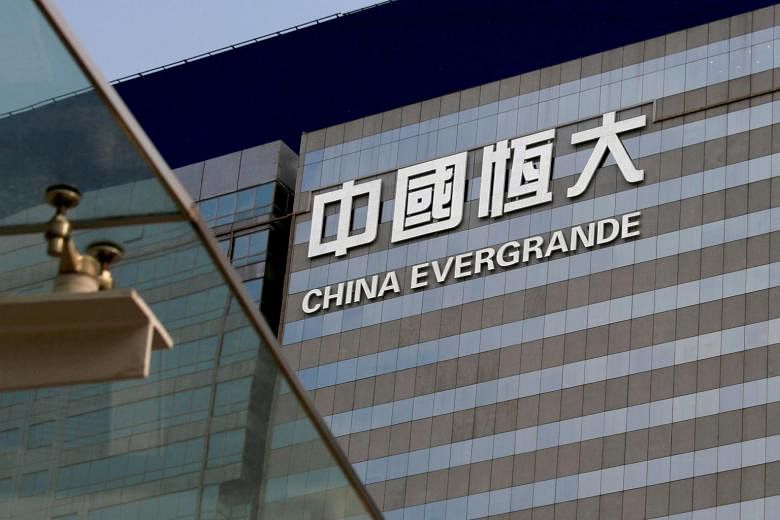HONG KONG (BLOOMBERG) - Suppliers of China Evergrande Group are becoming casualties of its deepening liquidity woes.
Skshu Paint, one of the developer's paint contractors, said it has signed agreements to receive three unfinished projects from Evergrande units to offset missed payments, according to an exchange filing. The properties are scheduled to be completed in 2022, 2023 and 2024.
As its cash buffer wanes, Evergrande has been offering real estate projects to offset payables to suppliers and contractors. Known in China as commercial bills, these short-term IOUs have become an important financing means for Evergrande, even though they aren't technically classified as debt.
In August, Evergrande included such properties in monthly contract sales for the first time.
Evergrande's trade and other payables climbed 15 per cent from December to a record 951 billion yuan (S$197.9 billion) at the end of June, accounting for almost half of its total liabilities. That stands in sharp contrast with its debt, which shrank to a five-year low of 572 billion yuan.
Evergrande said in its first-half earnings that some property development payables were overdue, leading to the suspension of work on some projects. The company is negotiating with suppliers and contractors to resume work.
Skshu said that Evergrande has paid 235 million yuan worth of overdue commercial bills, of which 94 per cent were in the form of unfinished properties, according to the filing. Only 15 million yuan were in bank transfers.
The painting firm has started to cash out some of these properties by selling them, it said. The properties are located in central Hubei province and the southern city of Shenzhen.
Meanwhile, a second credit-rating downgrade in as many days boosted concern the developer will default on its debt, sending its shares on Wednesday (Sept 8) briefly below their 2009 initial public offering price.
The stock touched HK$3.46 on Wednesday morning (Sept 8) in Hong Kong, breaching the HK$3.50 apiece offered on debut, before bouncing back to trade at HK$3.75 at 3pm. The shares have have tumbled about 73 per cent this year, while many of its US dollar bonds are hovering below 30 cents.
Fitch Ratings cut Evergrande to CC, saying a default seems probable as the company struggles to address its worsening liquidity issues.
"We believe credit risk is high given tight liquidity, declining contracted sales, pressure to address delayed payments to suppliers and contractors, and limited progress on asset disposals," Fitch said in a statement.
The move by Fitch came a day after Moody's Investors Service cut Evergrande's credit rating by three notches to Ca, which implies it is "likely in or very near default."
With more than US$300 billion (S$403.8 billion) of liabilities, Evergrande may roil lenders, suppliers, small businesses and millions of homebuyers should it collapse. Chinese authorities have kept quiet about their plans for the company so far, aside from urging it to resolve its debt risks.
Evergrande's rags-to-riches founder Hui Ka Yan built his empire more than two decades ago with heavy borrowings and a voracious land grab. The group skirted an earlier debt crisis last year with the help of wealthy friends and the government. Its problems since resurfaced after authorities imposed rules known as the three red lines, which determine whether companies can take on additional borrowings.
Evergrande itself last week warned of default risks if its efforts to raise cash fall short. Its cash coverage to short-term borrowings worsened in the first half to 36 per cent from 47 per cent from six months earlier, according to Bloomberg calculations based on an earnings statement. The company hasn't sold a dollar bond since January last year.

